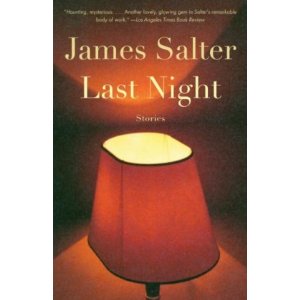James Salter: Last Night (Take 2)
By
Jesse Kornbluth
Published: Jan 04, 2011
Category:
Fiction
Writing about “A Christmas Carol,” I noted that “books change over time.”
In the case of the classic Dickens story, I meant 170 years.
Imagine my surprise when I picked up “Last Night,” James Salter’s most recent book of stories — published in 2005 and reviewed on these screens that year — and discovered it was not the book I thought I’d read. (To buy the paperback of “Last Night” from Amazon, click here. For the Kindle edition, click here.]
In my review, I mostly noticed the writing. Understandable. Salter has been called a “writer’s writer” for so long that this cliché has lost its teeth and grown a beard. You just can’t avoid it: He’s a master, he tunes you to his cadences, forces you to see the world his way. Give me two glasses of champagne, and I’ll go further: “the strongest male prose style since Hemingway.”
All that remains true for me. So what’s changed?
First, I’ve had five more years of bloated, overwritten novels, most sent by publishers but some selected by me. I don’t get it — who has the time to read a 400-600 page novel? Do you? I surely don’t. And as the years go by, my initial befuddlement at the padding in contemporary fiction has turned to disgust. Not at the writers — they’ve got computers and caffeine, and their fingers just fly over the keys. My gripe is with the publishers, who seem not to grasp that attention spans have changed and that many readers aren’t reading books on paper but via Kindle.
Salter. 10 stories. 144 pages. What’s not to like?
Size counts. But even more, story does. I didn’t notice the plots of these stories the first time around. But as I’ve become obsessed in my own writing with just telling a story, my reading has become focused more on story than style. So, this time around, I paid more attention to what happens in Salter’s stories.
Sex happens. Not on the page — Salter did that, decades ago, in A Sport and a Pastime. Now the sex is off-screen: in memory, in conversation. And, often, in secret.
I didn’t realize, until I watched a video of Salter, that “Last Night” is about secrets — or, at least, about information that’s withheld. That happens, he says, in seven of the ten stories.
The unknown. The intimate unknown. There’s almost always a betrayal involved. Tom McGuane has observed that Salter tends to see sex through the eyes of his women — and that what happens is often unfair to them. Lord knows the title story is ample proof — it’s about what is supposed to be the last night of a woman’s life. “Impeccable horror,” says McGuane.
At the end of a story about New York women on a night out, one of the women makes a remarkable confession to a cab driver. At which point, the narrative voice shifts, and he ends the story:
What if she is speaking the truth? He wondered…..You cannot know. That much he understood.
At the end of a Salter story, we know more. Not all. We don’t need to. But enough to notice we may have been holding our breath. Now, at least, we can exhale.


